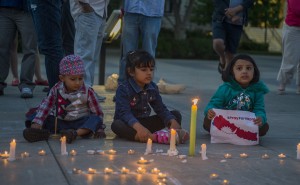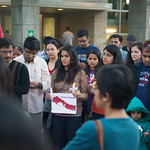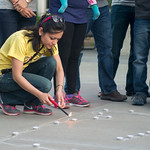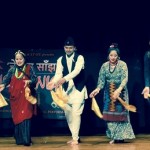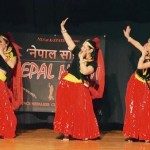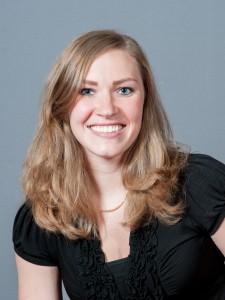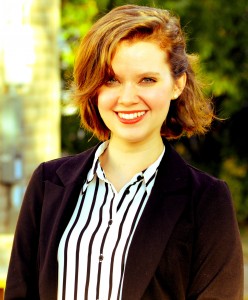This article highlights current students and alumni successes:
- 2015 Research and the State winners
- Nepalese student organization gives back to Manhattan after Nepal earthquake fundraiser
- Alumnae receives $30,000 to conduct research on trauma center
- Graduate Student Council GTA Teaching award winners
2015 Research and the State Winners
Ten Kansas State University graduate students have been chosen to represent the university at the 13th Capitol Graduate Research Summit, Feb. 2, 2016, at the State Capitol in Topeka.
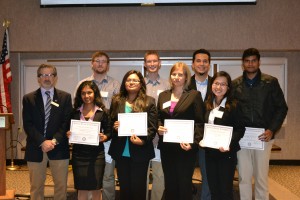
The students were selected based on their research presentations at Research and the State, an annual on-campus event that occurred Oct. 27 in the K-State Student Union. The graduate students are researching a variety of topics important to Kansas, including nutritional quality of grain products, food safety, animal health and product quality, among other topics.
Research and the State involved 50 participants from four colleges and 20 departments. The event was sponsored by the Graduate Student Council, the Graduate School, the Office of the President and the Office of the Provost and Senior Vice President. Each winner received a $250 scholarship.
“These students exemplify the quality of our graduate students and illustrate the excellence in research they are conducting that will benefit our state and the nation,” said Carol Shanklin, dean of the Graduate School. “Their mentors and the Graduate School administrators are proud of their accomplishments and look forward to them representing Kansas State University at the Capitol Graduate Research Summit.”
At the Capitol Graduate Research Summit, the 10 students have the opportunity to present and showcase their research in front of the Kansas Board of Regents and Kansas legislators. The annual statewide summit for Kansas legislators features current research of graduate students at Kansas State University, the University of Kansas, the University of Kansas Medical Center, Wichita State University, Fort Hays State University and Pittsburg State University. A university professor and an industry representative will judge the poster and student presentations. The top presenter from each university will be awarded a $500 scholarship.
The following Kansas State University graduate students were selected to present at the Capitol Graduate Research Summit:
• Bryant Miller, master’s student in marriage and family therapy, Goessel, for “What can we learn about health from Kansas teens: results of the Kansas adolescent health needs assessment.” His faculty mentor is Elaine Johannes, associate professor of family studies and human services.
• Matthew Galliart, master’s student in biology, Hutchinson, for “Adaptive ecotypic variation and genetic divergence of a widespread grass andropogon gerardii across a great plains’ climate gradient.” His advisor is Loretta Johnson, professor of biology.
• Nicole Delimont, master’s student in human nutrition, Lawrence, for “Protein quality and micronutrient availability of extruded corn, soy, sorghum, and cowpea fortified-blended foods.” Her faculty mentor is Brian Lindshield, associate professor of human nutrition.
• Tuyen Nguyen, doctoral student in chemistry, Manhattan, for “Engineering biomimetic nanoabsorbent for detoxification of chemotherapeutics.” Her faculty mentor is Santosh Aryal, assistant professor of chemistry.
• Syeda Rubaiyat Aziz, doctoral student in civil engineering, Bangladesh, for “Highway safety manual calibration and crash prediction for rural multilane highways in Kansas.” Her faculty mentor is Sunanda Dissanayake, associate professor of civil engineering.
• Caroline Ylioja, doctoral student in animal sciences, Canada, for “Spinning straw into milk: can an all-byproduct diet support milk production?” Her faculty mentor is Barry Bradford, associate professor of animal sciences and industry.
• David Gomez, master’s student in human nutrition, Colombia, for “Consumer acceptance of dry dog food visual characteristics.” His faculty mentor is Edgar Chambers IV, university distinguished professor of human nutrition.
• Soma Sekhar Sriadibhatla, master’s student in chemistry, India, for “Bisphosphonate functionalized nanomedicine for targeting bone microenvironment.” His faculty mentor is Santosh Aryal, assistant professor of chemistry.
• Olalere Olatoyre, doctoral student in agronomy, Nigeria, for “Genomic dissection of leaf and panicle architecture traits in sorghum using nested association mapping.” His faculty mentor is Geoffrey Morris, assistant professor of agronomy.
• Dilooshi Weerasooriya, doctoral student in agronomy, Sri Lanka, for “Transcription profiling of als herbicide resistant sorghums with early season leaf yellowing.” Her faculty mentor is Tesfaye Tesso, associate professor of agronomy.
A night to remember: Nepal Night
At the end of April, a 7.8 magnitude earthquake shook Nepal killing more than 9,000 and left many people homeless.
Following the earthquake, Abhishes Lamsal, K-State graduate student in agronomy and the Nepalese Student Association president, launched an all campus fundraiser for the victims of Nepal. They accepted monetary donations weeks following the earthquake and held a candlelight vigil in honor and remembrance of the victims. Through the fundraiser, the Nepalese Student Association was able to raise nearly $10,000 that went straight to the earthquake relief fund to help provide food, water and medical supplies to the victims.
In appreciation for the money donated for the Nepal earthquake relief, the Nepalese Student Association hosted an all campus ‘Nepal Night’. The event showcased the Nepalese culture and tradition through dances, songs and food. Over 300 people participated in the event.
To read the full Candlelight Vigil article visit it here.
Kansas State University graduate receives Rotary scholarship to research drama therapy for women with post-traumatic stress disorder
A Kansas State University graduate will use drama therapy to help internally displaced women in Colombia with post-traumatic stress disorder.
Jessica D. Muñoz, August 2015 master’s degree graduate in theatre with an emphasis in drama therapy, Albuquerque, New Mexico, received a $30,000 Rotary International Global Grant Scholarship to evaluate the effectiveness of trauma-centered group drama therapy with displaced women in Colombia.
Internally displaced people are similar to refugees in that they are forced to flee their home but they remain in the same country. According Muñoz, Colombia has the second largest population of internally displaced people in the world and about 60 percent are women and children.
“The emotional impact of displacement creates many challenges, such as the paralyzing effects of post-traumatic stress disorder, preventing people from rebuilding their lives,” Muñoz said. “While few studies have measured the rates of PTSD in internally displaced people, recent clinical studies demonstrate that rates of PTSD among refugees range from 39-100 percent — compared to 1 percent in the general population.”
Muñoz will work with Sally Bailey, professor and director of Kansas State University’s drama therapy program, and Jorge Palacio Sañudo at the La Universidad del Norte in Colombia. The goal of the project is to help participants build a community of trust and empathy in a safe environment so they can share stories and heal. As the project progresses, researchers will measure the overall improvement in mental health, including the severity and frequency of PTSD symptoms.
“There is not enough research published yet on the effectiveness of drama therapy,” Bailey said. “Yet, we know from our experiences — anecdotal though they may be — that drama therapy works extremely well for clients who have experienced trauma. I am so excited that Jessica will have the opportunity to research the efficacy of drama therapy with displaced women in Columbia.”
The Global Grant Scholarship is awarded for graduate level academic studies and/or research, which must occur in a foreign country. The scholar completes classes, conducts research or a substantial project that aligns with one of Rotary’s areas of focus.
“The interview and selection process for the scholarship is rigorous,” said Rebecca Gould, co-chair of the scholarship committee for the Konza and Manhattan Rotary clubs and director of the university’s Information Technology Assistance Center. “Jessica’s research is unique and includes four of Rotary’s six areas of focus — peace and conflict prevention/resolution, maternal and child health, basic education and literacy, and economic and community development — by providing training to professionals using her skills as a drama therapist.”
Muñoz is a member of the North American Association of Drama Therapy. She worked as a refugee advocate for the Refugee Well-being Project at the University of New Mexico and was a student delegate for the United Nations Commission on the Status of Women in New York. She completed a residency at the Post Traumatic Stress Center in New Haven, Connecticut, was a site leader for the Manhattan chapter of Hollaback! and a facilitator for Kansas State University’s Center for Advocacy Response and Education. She will start the research in February 2016 in Barranquilla, Colombia.
“It is critical that innovative ways to address the trauma of displacement are developed and integrated into systems of crisis intervention,” Muñoz said. “The development of trauma-centered group drama therapy holds the potential to improve the collective and personal psyches of female internally displaced people in Colombia and across the globe.”
This article was written and published by K-State Today.
Master’s and doctoral GTAs selected for university’s Graduate Student Teaching Excellence awards
Two Kansas State University graduate students are recipients of the Graduate Student Council Award for Graduate Student Teaching Excellence.
Sponsored by the Graduate Student Council, this award recognizes graduate teaching assistants who have excelled in classroom teaching and serves to promote awareness of the important contributions graduate students make to the scholarship of the university. The recipients will represent the university as the doctoral and master’s nominees for the Midwestern Association of Graduate Schools, or MAGS, Excellence in Teaching Award.
The doctoral GTA award winner is Chelsea Schnabelrauch Arndt, doctoral student in psychological sciences, Pinckney, Michigan. Her adviser is Laura Brannon, professor of psychological sciences. The master’s GTA award winner is Katrina Hanna, master’s student in communication studies, Perryville, Arkansas. Her adviser is Soo-Hye Han, assistant professor of communication studies.
“Looking back on my journey so far through graduate school, I think the most important thing that set me up to win this award is that I jumped at every opportunity that was given to me to teach and improve my teaching,” Arndt said. “I’ve never turned down a chance to teach, and I sought out opportunities to teach when ones weren’t offered to me.”
“Being a graduate teaching assistant at K-State has opened a space for me to think critically about the opportunities that I wish to afford to my students,” Hanna said. “During my time, I have learned that inflexibility with students is not a virtue. If you show them that you are willing to work with them, the majority of the time they will reciprocate that effort.”
A master’s student and a doctoral student are selected for the Graduate Student Council Award for Student Teaching Excellence each year. Each award recipient receives a $500 scholarship, and his or her name and department are engraved on a perpetual plaque to be displayed in the student’s department until the next award is given.
“Chelsea and Katrina are outstanding examples of the quality of teaching and mentoring that our GTAs provide K-State undergraduates,” said Carol Shanklin, dean of the Graduate School. “I am honored that they will be representing our GTAs as K-State’s nominees in the MAGS competition.”
The MAGS Excellence in Teaching awards were created to recognize the importance of excellence in teaching and mentoring as a component of graduate education and the preparation of graduate students for future service as college and university faculty. Arndt and Hanna will compete for a $750 honorarium that will be presented at the 72nd annual MAGS meeting, April 5-8, 2016, in Chicago. One master’s student and one doctoral student are selected for the MAGS award.
Since the MAGS Excellence in Teaching Award was established in 2011, Kansas State University has had three winners.
The Midwestern Association of Graduate Schools is a regional affiliate of the Council of Graduate Schools. The association’s member colleges and universities are accredited institutions of higher education in the central U.S. that offer graduate programs leading to masters, specialist and doctorate degrees.
